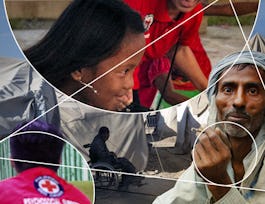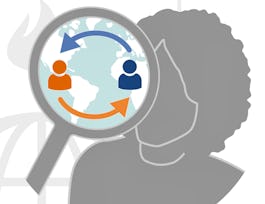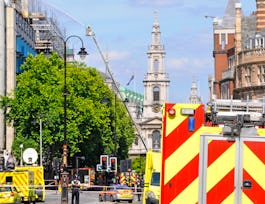At the global level, there are many countries marked by violence affecting health care. The 'Health care in danger' project aims to establish practical measures and recommendations that can be implemented on the ground by policy-makers, humanitarian organizations and health professionals. In view of the multiplicity of actors and latitudes concerned, it is essential to be able to make available the tools needed to make informed decisions, guide behaviour in high-risk areas and provide everyone the means to create and optimize the dialogue between humanitarian professionals and health on the one hand and relevant authorities or other armed actors. This course covers various topics such as ethics, rights and responsibilities of the staff of health and pre-hospital personnel, issues related to international law and humanitarian law, international human rights, caregivers and patient safety as well as the role of communities to address and reduce violence against health care.



Violence Against Healthcare



Instructors: Beat Stoll
Sponsored by PTT Global Chemical
5,171 already enrolled
(74 reviews)
Details to know

Add to your LinkedIn profile
5 assignments
See how employees at top companies are mastering in-demand skills


Earn a career certificate
Add this credential to your LinkedIn profile, resume, or CV
Share it on social media and in your performance review

There are 8 modules in this course
What's included
2 videos5 readings
The purpose of this first module on violence against health care Is to highlight and understand the situations and the constraints faced on the ground in conflicts and emergencies. These sitautions will be analysed both from the health care providers perspective as well as from the beneficiairies perspective. A special focus on Mental Health and psychosocial support, ethical dilemmas and riks analysis
What's included
12 videos1 reading1 peer review1 discussion prompt
Today, an elaborate international legal framework exists whose aim is to guarantee protection of patients and health-care providers from violence in armed conflict or other emergencies. However, violence against patients and health-care providers remains a sad reality in such situations. Still, it is important for those who have an influence over the respect for the law, like State authorities, State armed forces, armed groups or members of communities, as well as for health-care professionals or those who will become health-care professionals themselves to identify who has to follow the law, what the rules describe and when they apply. A better understanding of the law may contribute to better behavior on the ground, if there is general willingness to comply with legal rules. For health-care professionals, the law may be a tool that can be invoked towards authorities, armed forces, armed groups and others for more effective protection. This module should contribute towards these aims by identifying international legal rules relevant to the protection of patients and health-care providers and pointing towards legal and practical challenges in their implementation.
What's included
12 videos2 readings1 assignment1 discussion prompt
This module will inform you of the the general security challenges that ambulance and prehospital services face in situations of armed conflict or other emergencies. Unfortunately, challenges also include targetted attacks or threats of violence against the ambulance and prehospital. Direct and indirect attacks may be carried out by arms carriers, but also by the local communities themselves. Through the following chapters, we will try to understand some of the reasons behind such threats and attacks, as well as present you with some solutions that the service providers can implement to reduce risks and the impact that threats and attacks may have on the service providers and the people they seek to help. It should be noted that these solutions and good practices have to be considered up against the context in which they are to be implemented. What works in one country or area, may not be as relevant in another.
What's included
10 videos1 reading1 assignment1 discussion prompt
This module speaks of how health services are valuable at any time, but particularly during emergencies resulting from any hazard (radio nuclear, disease, chemical, food safety, social/political, natural); during emergencies, hospitals may face the additional burden of overcrowding, infrastructure damage, loss of staff, and increased violence against health care facilities and workers becoming victims of the emergencies themselves; therefore hospitals must be strengthened to stay safe and resilient even when faced with these difficult challenges.
What's included
12 videos1 reading1 assignment1 discussion prompt
This module speaks of the vital role Non-State Armed Groups (NSAGs) play as recipients and providers of health care. This lesson delineates different ways armed groups can pose a threat to the safe provision of health care, but also how armed groups act as health care providers themselves. The lesson also highlights key tools to safeguard the provision of health care in conflict settings, i.a. doctrine, education, trainings, and sanctions, and critically discusses limitations to their applicability.
What's included
8 videos2 readings1 assignment1 discussion prompt
The purpose of this module is to highlight and understand the role civil society has in the medical mission. Civil society includes those who are actors themselves in the medical mission, as well as those who protect and promote access to health care. This module will look at how Red Cross and Red Crescent National Societies, communities, medical associations and religious circles have the ability to strengthen the provision of health care and to influence relevant parties in showing respect for the medical mission. The module will allow learners to understand the bigger picture in terms of actors involved and their role in the concept of “health care in danger”.
What's included
8 videos5 readings1 assignment1 discussion prompt
What's included
1 video
Instructors



Offered by
Why people choose Coursera for their career




Learner reviews
74 reviews
- 5 stars
69.73%
- 4 stars
19.73%
- 3 stars
2.63%
- 2 stars
2.63%
- 1 star
5.26%
Showing 3 of 74
Reviewed on Aug 21, 2020
Very well designed syllabus and very good resource persons. Thank you!
Reviewed on Jul 12, 2017
Very clear, plenty of example and raise awareness about a critcal topic.
Reviewed on Aug 29, 2019
It is a great opportunity to learn about the violence against healthcare from this MOOC. It's excellent that everything is very clear with as much as showing demonstration from the field.
Recommended if you're interested in Social Sciences

University of Copenhagen

University of Michigan

Johns Hopkins University

Universiteit Leiden

Open new doors with Coursera Plus
Unlimited access to 10,000+ world-class courses, hands-on projects, and job-ready certificate programs - all included in your subscription
Advance your career with an online degree
Earn a degree from world-class universities - 100% online
Join over 3,400 global companies that choose Coursera for Business
Upskill your employees to excel in the digital economy





